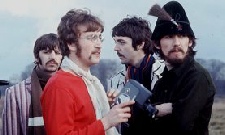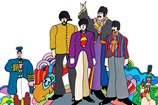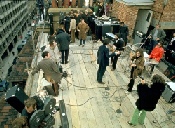





The Beatles had a limited but largely successful film career beginning with A Hard Day's Night (1964), a loosely scripted comic farce, sometimes compared to the Marx Brothers in style. It focused on their hectic touring lifestyle and was directed in a black-
In 1965 came Help!, a Technicolor extravaganza shot in exotic locations with the style of a James Bond spoof..
Magical Mystery Tour, a McCartney idea adapted from Ken Kesey's Merry Pranksters LSD-
The animated Yellow Submarine followed in 1968, but had little input from the Beatles themselves, except for a live- d to have been pleased with the result, and attended its highly publicized London premiere.
d to have been pleased with the result, and attended its highly publicized London premiere.
"Let It Be" was a troubled documentary capturing The Beatles during their tumultuous final chapter, filmed over an extended period in 1969. The music featured in the film became the basis for an album of the same name. Although the recordings predated Abbey Road, contractual disputes and the heavily debated production alterations by Phil Spector delayed its release until 1970.
But in November 2021, Peter Jackson's "The Beatles: Get Back" a three-
Production of The Beatles: Get Back employed film restoration techniques developed for Jackson's “They Shall Not Grow Old”. His production company, WingNut Films, also utilized its audio restoration technology to isolate recordings of instruments, vocals, and individual conversations onto separate audio tracks.



